
Spain’s variety of festivals have an entire category of riotous celebrations that resemble food fights. This really differs from the usual way one would go about experiencing Spain’s unique cuisine and world-famous produce. So if you’re up for a bit of let-your-hair-down, wear-your-worst-shoes, really set yourself loose in a wholesome kind of grandmothers-cooking-meets-mosh-pit type of way, then these events should undoubtedly be on your bucket list! I mean we’re talking a real congregation of jolly-golly ritualistic food-pelting-ruckus. Picture the friendliness of beach volleyball with a well seasoned dose of rough-and-tumble, quite frankly filthy good old fashioned fun.
Article by Sophie Gatward-Wicks
Meringue Fight! – La Merengada
Vilanova i la Geltrú (Barcelona), February
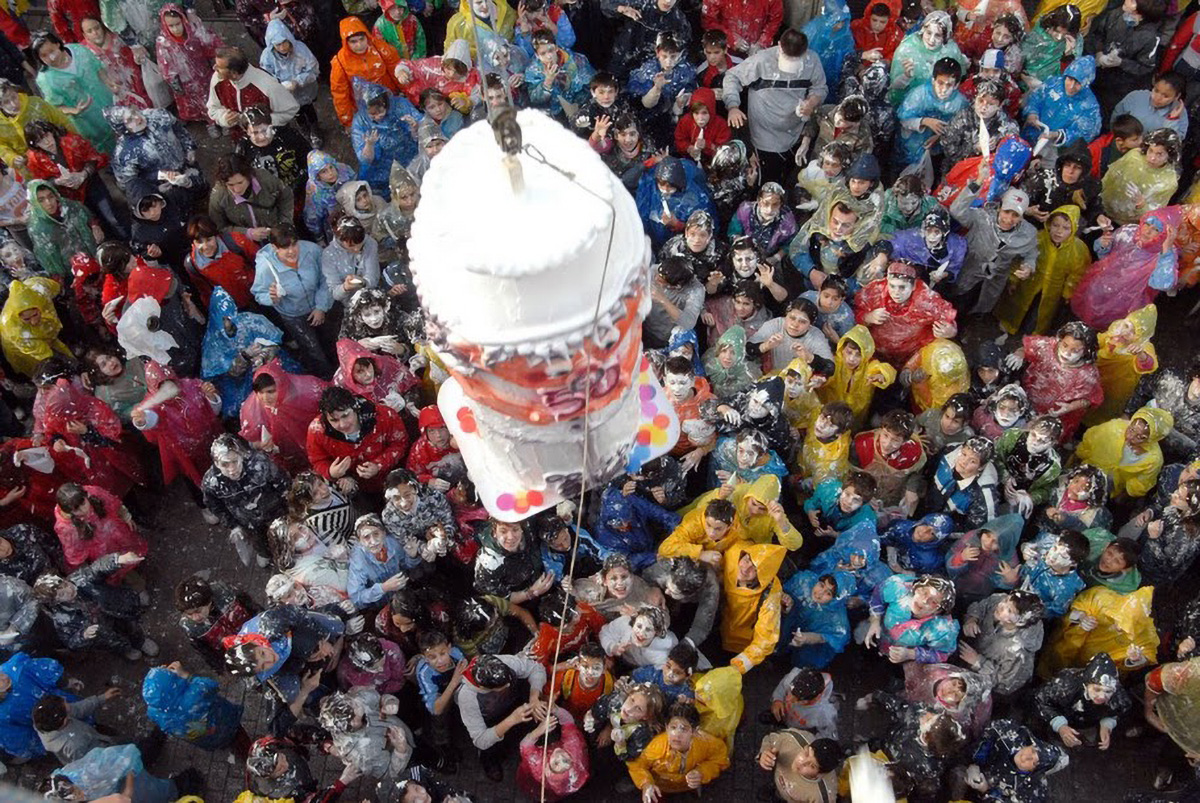
Vilanova i la Geltrú is the name and place of the festival in Barcelona, beginning at the end of February, of which the highlight is La Merengada. Taking the prize for the sweetest food fight in the country, an entire day is dedicated to meringue-flinging, occurring on the Thursday before Ash Wednesday known as Jueves Lardero, Maundy Thursday. Besides the highly anticipated food-fight, the festival offers fine foods and drink, live music with 100 different brass bands from around Catalonia, an orchestra and magical ball held in the square, as well as carnival-style parades complete with fancy dress, floats and dancing. Each day has its own theme and programme of performances and activities to represent the origins of the event’s purpose. The history of the festival can be traced back to the medieval times, over 250 years ago, where it grew from a simple carnival for jugglers, musicians and street performers to gather and demonstrate their skills to the townspeople. The finale of Vilanova i la Getrú lands on Ash Wednesday, where the day is rounded off by a large bonfire being lit in the City centre.
Programme: carnavaldevilanova.cat
Tomato Fight! – La Tomatina
Buñol (Valencia), August
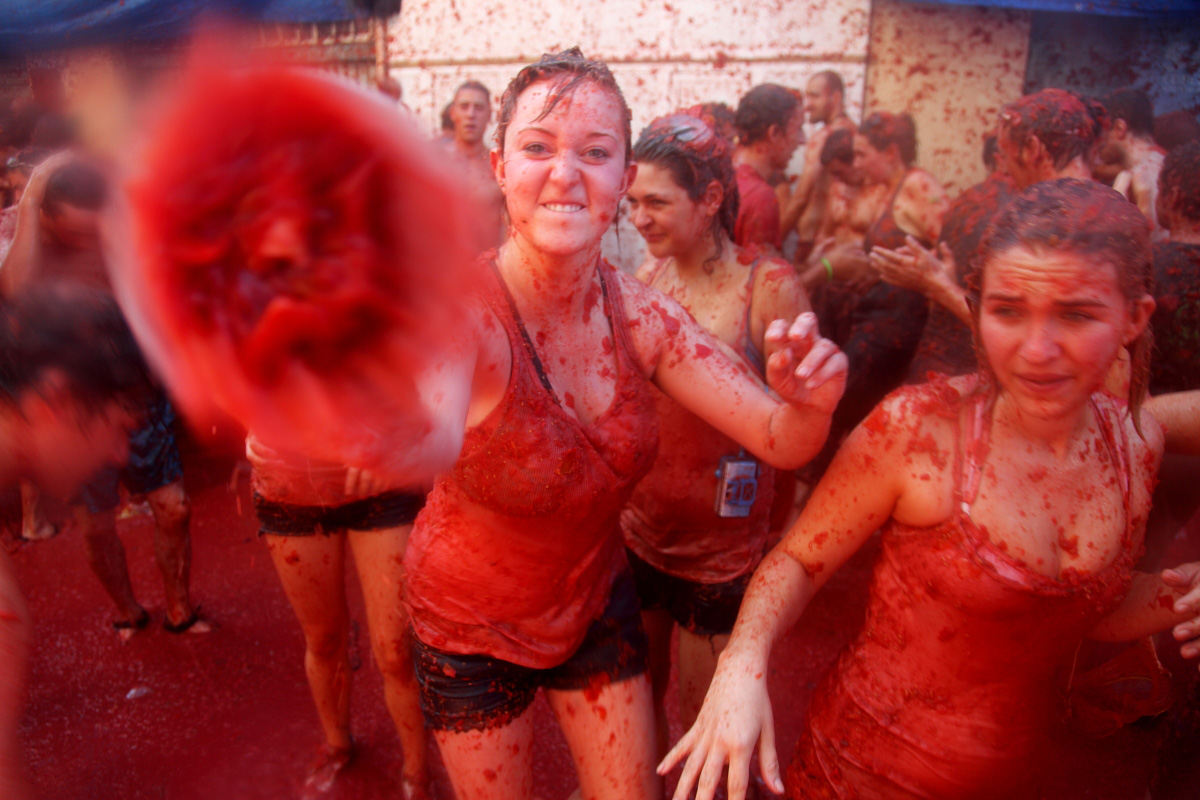
Known as the world’s biggest food fight, the tomato-throwing festival La Tomatina, takes place annually on the last Wednesday of August (30th of August for this year, 2023). Hosted in the town of Buñol in Valencia since 1945, the hour-long battle transforms the streets into a river of red pulp, where approximately 150,000 tomatoes are pelted and squelched.
A limit of 20,000 tourists can now rock up to participate in the event, of which the origins are not fully documented. Though several legends exist as to why the first tomatoes were slung, the most common hypothesis revolves around a street brawl which erupted, and those involved started throwing tomatoes at each other from a spilled-over vegetable stand. Another popular theory is that there was a town celebration, during which a group of disgruntled town folk attacked the city councilmen by tossing tomatoes. This event was enjoyed to such an extent by the townspeople, that they endeavoured to repeat it the following year, and the next, thus forming the tradition. The holiday was banned in the 1950s during Franco’s rule for having no religious significance, but returned to the streets in the 1970s. The liberty to once again be allowed to throw tomatoes at a prepped, prompted and consensual tomato throwing event beloved by the people will always be a win for society, and highlights the playful undertone of anarchy that energises the experience.
Book here: latomatinatours.com
Grape Fight! – La Festa des Vermar
Binissalem (Mallorca), September
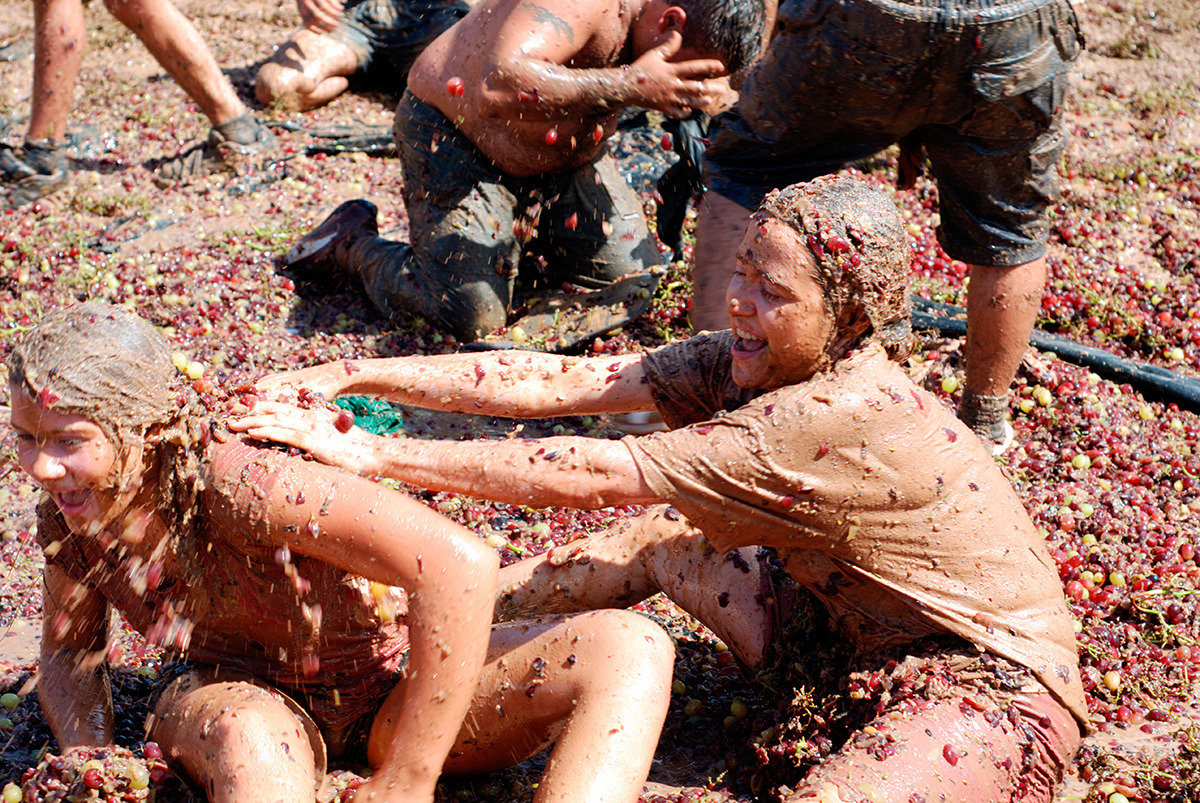
La Festa des Vermar, The Festival of Wine, is a two-week affair that usually kicks off from the last week of September. The event, held in the wine town of Binissalem, is filled with fun and lively celebrations of the grape harvest and the Mallorcan culture. Participants can enjoy parties featuring traditional dance and folk songs, fireworks, fire-dance performances and local dishes such as the Fideus de Vermar (slow cooked lamb in red wine and spices with fideua noodles). The main attractions being anything wine or grape-related, from eating grapes to wine tasting and even a Concurs de Trepitjar Raïm, Grape Treading Contest, which is held in the church square. During the contest, people team up and have to tread barefoot in wine barrels whilst holding onto each other’s shoulders to extract as much juice as possible in just 3 minutes.
The kicker of the event is the Gran Batalla de Raïm, the Great Battle of Grapes, which is initiated after a rocket launch is set off, signalling the grape-dodgers and throwers to gather in a field near the village square where mounds of the manto negro grape variety has been placed, ready for the throwdown to begin. Everyone waits in anticipation until a town official blows the whistle, and then it’s game-on. The site quickly transforms into a grape flavoured mud-bath, with some 10,000 kilograms of grapes provided just for throwing!
Bonus: Free wine for everyone! Both new and old harvests are served free of charge.
Additional info: radseason.com
Wine Fight! – La Batalla del Vino
Haro (La Rioja), June
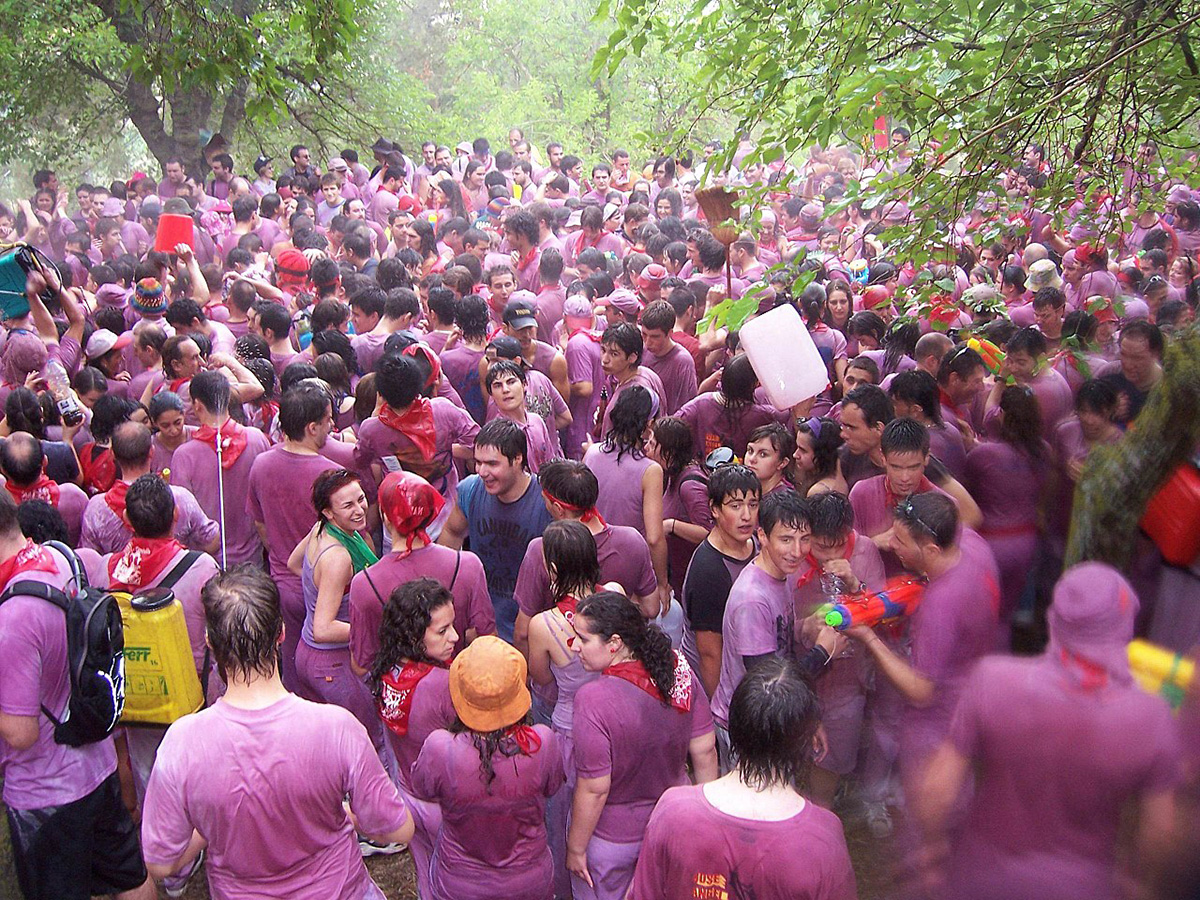
On the subject of wine, La Batalla del Vino, Battle of Wine in Haro is a top bucket-list favourite. If you thought drinking Rioja out of a stemmed glass was enjoyable, try shooting it out of an industrial grade water pistol at thousands of other wine-crazed celebrators. Connoisseurs needn’t gasp at the thought of wine being wasted either, as these are the batches that weren’t good enough to be bottled, and would have ended up being shipped off to a vinegar factory instead. This is a much happier ending for the wine’s life cycle indeed, as the traditional red and white nectar is splashed over thousands of wine enthusiasts via buckets, cups, bottles, hoses, water guns, jugs and probably many other inventive containers that do the trick. The initiation of the actual wine battle itself permits for little sleep to be had the previous day, especially if you attend La Fiesta de San Pedro, The Feast of Saint Peter the night before. On June 29th at 7am, the Mayor of Haro, on horseback, leads the crowd on a six kilometre pilgrimage to the Chapel of San Felices. After placing a ceremonial flag at the top of the rocks, a short mass is held, after which the hectic wine fight ensues. Now declared a Festival of National and Touristic Interest by the Spanish Government, its roots date back as far as the 6th century.
Additional Info: harowinefight.com
Flour Fight! – Els Enfarinats
Ibi (Alicante), December
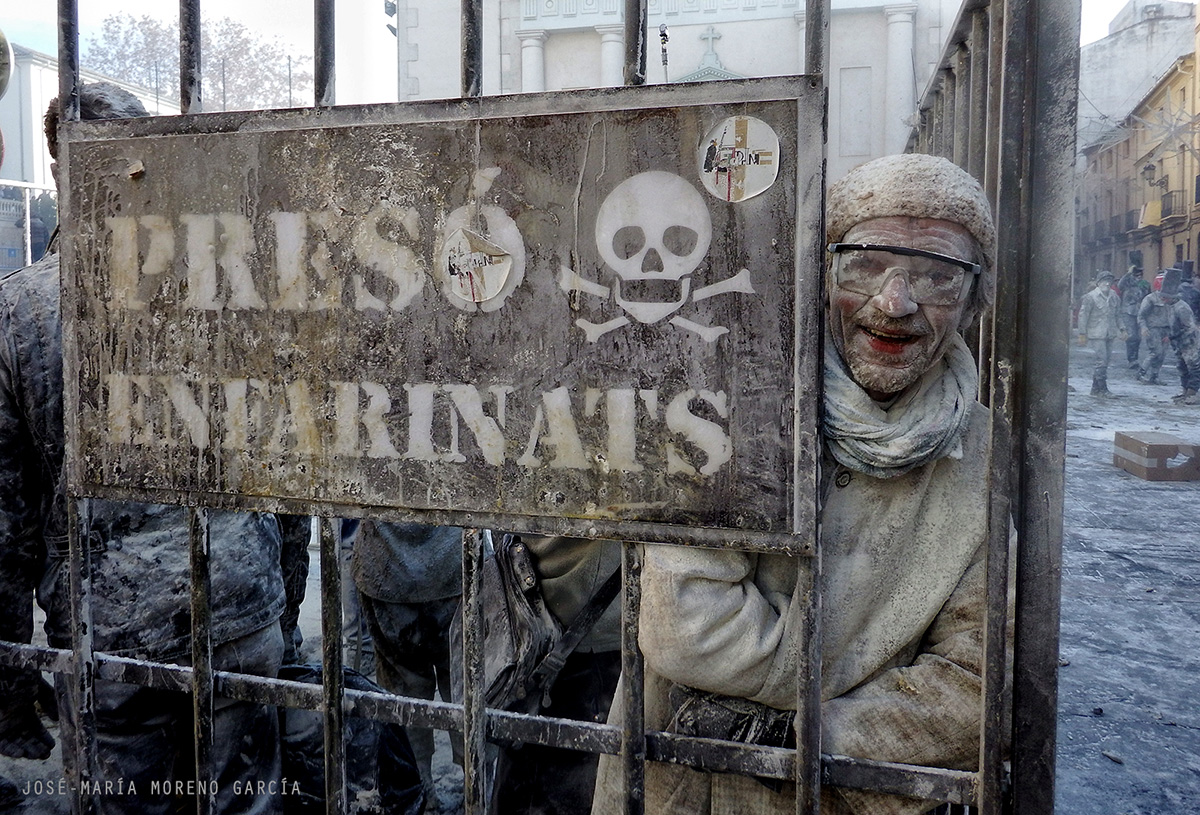
Els Enfarinats – La Rebelión de Huevos y Harina literally means “The Floured Ones – The Rebellion of Eggs and Flour”. It is a festival that embraces the spirit of mischief, and marks Spain’s April Fool’s day, the ‘Holy Innocents Day’ on the 28th of December. Carrying way more charm and intensity than just playing pranks, the event is surprisingly aesthetic. The act of hurling flour and eggs is a friendly-fire battlefield, where scenic colour-smoke and fire crackers are deployed as the folk wearing mismatched military garb and sashes patrol the streets. At the same time, people recognised as La Oposicio, The Opposition, try to restore peace. The combination of different characters portrayed in costume and brightly painted faces amid plumes of colour and white flour makes for a photographer’s paradise. Amid the organised chaos, a rich history is brought to life in this cosplay of participants in mock military attire, exercising a 200-year-old tradition. The ”military” men stage a coup d’état, in commemoration of the Biblical story of King Herod and the Massacre of the Innocents. If you are caught breaking any of their wacky made-up laws, then you are slapped with a fine (which if paid is donated to charity). The festival is a surreal experience with more than the re-enacted coup and subsequent food-fight, that submerges you into the true personality of the town, and is a great reminder of Spain’s rich culture, vibrant people and historical heritage whilst feeling like you’re an extra on a movie set.
Additional info: radseason.com



































































